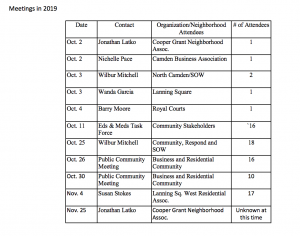So there’s a lot of chatter going around about the proposed Camden Business Improvement District (CBID). Coming on the heels of some, ahem, controversy about tax subsidies, and the boondoggle about the police taking over code enforcement, there is both increased scrutiny and attention on City Hall right now. So I thought I’d share a few quick thoughts and resources.
If you’re interested in CBID skepticism, a few folks put together a video:
Hi Facebook Family, the Mayor’s office and City Council are trying to refine the City in order to make it more commercial. The homeowners will be forced out.
Posted by Vida Neil on Sunday, December 1, 2019
I’d summarize the critique as essentially being worried about: 1) gentrification and 2) democratic oversight. There’s also a subtler critique of public-private partnerships v. governmental service provision tucked in there that’s worth wrestling with.
I did a quick dive into the city’s page on CBID (here it is) and had a few more takeaways:
- BIDs are, generally, another way to leverage resources for needed services in commercial downtowns. One of the earliest (and most successful) examples is the Center City District in Philadelphia. This BID is clearly based off of that one, and designed to permanently fund the CSSD which has been providing services downtown for a while.
- I think this is pretty center-of-the-road policy. It largely taxes business entities (not residents), to provide services in commercial districts. There are some spill-over effects for residents that seem to me to be mostly positive.
- This leads to two more general critiques of BIDs — the first is that they only cover a small portion of the city (essentially those with enough businesses to sustain them), the second that they come with the risk of increasingly home values. As you can see, these are somewhat at odds, though there is some legitimacy to each. BIDs largely provide services that homeowners want, and do so by largely having businesses pick up the bill. There’s some sticky details (and clever ones, like requiring abandoned property-owners to pay in, ensuring they do their fair part in the neighborhood), but while I’m generally quite friendly to gentrification arguments, I’m skeptical of gentrification arguments that undermine policies that provide basic quality-of-life increases. Frankly, I’m more comfortable with a BID than the current arrangement, in which it is someone other than local businesses paying for CSSD. I’d rather shift to a world where businesses are paying for services in their own neighborhoods than have the city seeking private (grant?) funding to support its most commercial areas. This, if done equitably, is fairer and more sustainable.
- The largest, and in my mind, fairest, critique of the BID is how to make it responsible to community members as well as businesses. Given the state of local politics, that’s a legitimate question to ask. The CBID report lays out the community outreach process thus far (sorry for the blurry screen shot, the link has the full details):

The City’s press release lays out the way that CBID will be governed: “The BID would be governed by a 13-member Board of Directors, comprised of (1) member of
Camden’s local governing body; (10) representatives of businesses and other entities inside the
BID; and (2) Camden residents selected by the Mayor.”
I get those that have lost faith in the ability of the city and the nonprofit sector here to equitably manage a program like this. It’s pretty clear that we’ll see a fair bit of the usual suspects managing this nonprofit and on its board. But opposing solid legislation because the wider governance system has flaws takes the city to a very weird place — where nothing should be passed until leadership changes. That’s not where I am right now, and probably merits its own post.
All that said, some folks that I’ve learned a lot from will be at City Hall protesting this tomorrow, and I look forward to learning more about their concerns — I’ve found community voices often get lambasted as opposing policy when they want to make sure these policies avoid doing harm. That might be the case tomorrow. The city is obviously worried, they’ve rescheduled the Tree Lighting to avoid a protest there, and released a fact check on CBID that’s making the rounds on social media.
In the meantime, let us know what you think about the BID, or any of the other things going on in Camden. Always looking for local voices to contribute to this space!